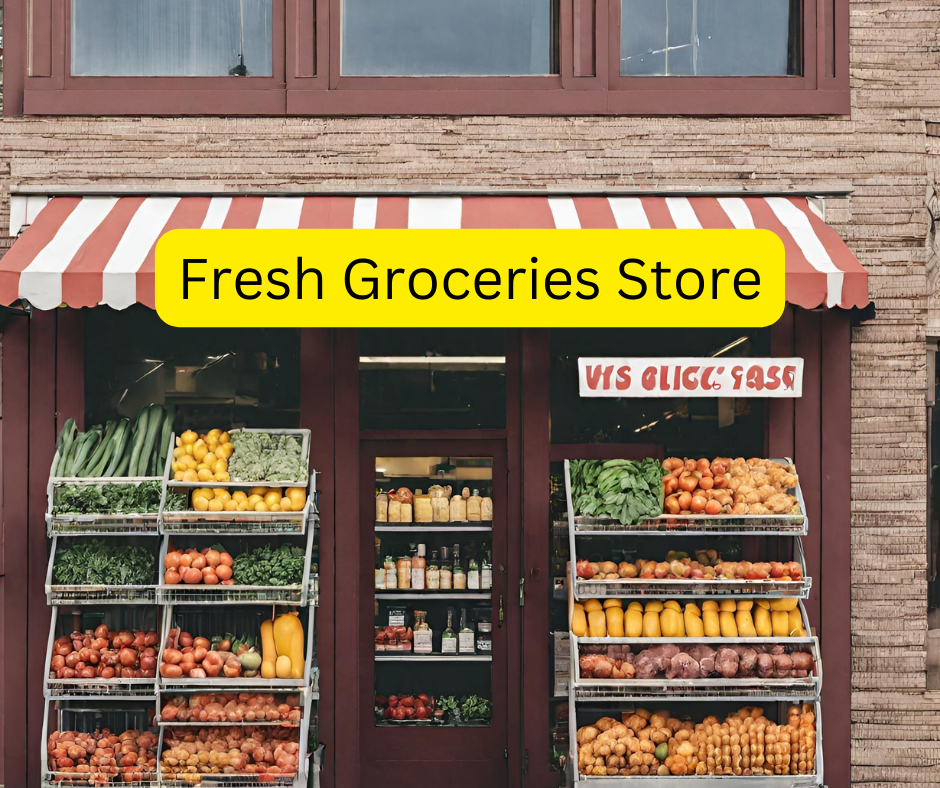Have you ever wondered whether grocery business people make profits? Well, ‘mama mboga’ makes lots of profits, especially those in busy streets in any town in Kenya. You can also start a grocery business in Kenya and make profits.
In this guide, I will show you how to start a grocery business in Kenya—small or large scale, tips for success, and the challenges you may face. Grocery is among the businesses you can start with a capital of 1k or more, depending on your ability.
If you follow this guide keenly, you will get first-hand insights on how to start and succeed in the grocery business.
Remember to subscribe to my newsletter for exciting offers and freebies.
Keep reading.
Requirements To Start a Grocery Business in Kenya

Before you can start selling groceries in Kenya, you need to ensure you have the following:
1. Capital, starting from 1k to 50k or more
If you want to start a small-scale grocery business, you can start with as little as 1k. However, you need at least 50k to start a big-scale grocery business in Nairobi. But you can always start small and grow your stock levels as you move on.
2. A busy street to set up your grocery business
Before you can think of starting a grocery business in Kenya, ensure you research the best locations where you can set up your business. For instance, choose a location with residential estates and near roads.
3. A good supplier of the groceries you need
After your capital is ready, research the best sources to buy groceries at wholesale prices. In most Kenyan markets, there are grocery suppliers who supply on specific days. Alternatively, if you can easily access vegetable farms nearby, you can buy them from the farm.
4. A business permit
If you need to start a large-scale grocery business in Kenya, you need a business permit license from the county government. You can pay as little as Ksh.3000, depending on your county government.
Small-scale mama mbogas do not pay for business permits in some counties, while others pay as little as Ksh.1000 annually, depending on the county government.
5. A health licence
You should have a health license for your grocery business in Kenya. In most counties, you will pay at least Ksh.1000 for a health license.
6. A stall
To start a small-scale grocery business in Nairobi or any other part of the country, you need a wooden or metallic stall to display your groceries. I recommend you start with a wooden stall as it’s cheaper than metal. To start a large-scale grocery business, you need to rent a shop in a busy location.
What To Stock in Your Grocery Business in Kenya

You can be worried about what to stock and what not to stock in your grocery store in Kenya. The following list should help you start a grocery business in your preferred location.
- Cabbages
- Sukuma wiki
- Spinach
- Onions
- Tomatoes
- Potatoes
- Cucumbers
- Carrots
- Dhania
- Ginger
- Saumu
- Pepper
- Fruits
You can add more spices such as pilau masala, tea masala, ground ginger, ground saumu, etc.
How To Start a Grocery Business in Kenya With 1k

To start a small-scale grocery business with 1k, you should find an excellent location to set up your business. You can ask the available mama mbogas to help you find a space for your business.
Start with little cabbages, sukuma wiki, tomatoes, onions, and potatoes. You should also take a small basin, knife, water, and bucket from your house to wash the vegetables before cutting them.
Depending on the season, cabbages can cost between Ksh 20 and 80. You can slice them to get maximum profits. Sukuma wiki costs around Ksh.20 to Ksh.30 per kilogram, depending on location. You can start with as much as 5kgs.
Tomatoes usually range between Ksh. 30 and Ksh.50 per kg, and you can buy two or three kilograms. Onions range between Ksh.80 and Ksh 150 per kg, so you can start with one or two kgs.
You can use the balance to buy packing bags, two sacks, and an authorised nylon paper to display your vegetables.
Always ensure you buy little stock for the most perishable vegetables. Purchasing small amounts of perishable vegetables will spare you losses if they go bad. However, as you stabilize the business, you can add more stock of the fast-moving goods.
How To Start a Grocery Business in Kenya With 50k or More

If you want to start a large-scale grocery business in Kenya, you need 50k or more to set up your business.
You need to rent a shop in a busy location. You can rent starting from Ksh. 5k to 10k, depending on your location. The less the rent, the better. You need to reduce expenses to maximize the potential profits.
After you’ve got a shop, you should spend around 10k to set up display shelves. Again, ensure you minimize expenses for setting up the shelves. You can continually advance later after the business stabilizes.
You should now start stocking your grocery store. Ensure you balance the stocking of highly perishable groceries such as tomatoes, sukuma wiki, etc. For the less perishable items such as onions and potatoes, you can stock more. However, this depends on the fast-moving items in your business.
You can also do proper branding for your grocery store in Kenya. Get a professional painter to brand your shop to your desired name and colours. Depending on your location and design requirements, you can spend between Ksh. 1000 and Ksh. 3000.
After you’ve set up your shop, go to county and health offices and let the officials assess your business. Afterward, pay for a business permit and health license to avoid disruptions during business hours.
Tips For Success in Grocery Business in Kenya
1. Have a business plan.
Before you start selling groceries in Kenya, ensure you draft a business plan to ensure you have everything you need. You can do it yourself or hire a professional to help you craft a business plan for your business.
2. Choose a busy location.
People will always consume groceries. However, they would prefer to get to the grocery shops near them. Therefore, set up your grocery store in residential estates. The faster your shop is accessible, the more you will have customers.
3. Keep records
Do you know that 16% of businesses fail because they lack a proper business model, such as record keeping? You can avoid falling into that category by keeping clear records of purchases, sales, and expenses.
4. Save to buy a fridge
If you stay in the grocery business, you should aim to buy a fridge to store highly perishable fruits and vegetables. A refrigerator can help you avoid losses if the groceries do not deplete in three to four days. In addition, a fridge will help you stock more, and you will always have stock to sell. This idea will help you gain more customers since most customers like to shop where they get everything they need.
5. Stock the fast-moving groceries.
As you thrive in the grocery business, you should monitor the flow of different products. After you’ve known what moves fast and what doesn’t, you should focus on the fast-moving products to see fast returns.
6. Market your business.
Shop branding is great, but it would also help if you market your grocery store on social media to the right audience.
For instance, if you operate a large-scale grocery store, your marketing efforts can lead to an increased customer base from the neighboring towns. In addition, marketing can also help you get offers from small-scale to large-scale farmers willing to sell to you at relatively low costs.
Challenges Facing Grocery Businesses in Kenya
Starting a grocery store doesn’t mean you will not face any challenges when running your business. However, with a positive mindset, you can overcome the obstacles and thrive in the industry.
After meeting with more than 50 grocery store owners in Nairobi, I noted the following challenges they face.
- Perishability of the goods
Let’s agree that no matter how careful you are, you can also undergo losses due to the perishable groceries in your store. Most small and medium grocery stores in Kenya find it hard to invest in proper storage for their groceries.
- Change in seasons
As we all know, most groceries in Kenya are seasonal. For instance, sometimes, tomatoes will be scarce, and other times, plenty. The uncertainty of the grocery seasons can affect the stocking of most grocery stores in Kenya.
- Less capital
We all know that money has been an issue in Kenya, especially now when the economy is so bad. Most businesses are facing challenges in expanding their businesses since most cash goes to maintaining their families. More than 50% of grocery store owners said that they depend on their store for their family’s upkeep, making it challenging to grow their businesses.
- Loans
Most grocery store owners agreed that loans have made them stagnate in the growth of their business. Some of them took loans with high interest rates, which made it tough to repay.
- Change in consumer behavior
Due to the high living costs in Kenya, most people have opted to cut costs to survive in these tough times. Some consumers have created kitchen gardens to cut costs in groceries, which is affecting the grocery business in Kenya.
Conclusion
With a positive mindset, you can start and succeed in the grocery business in Kenya. All you need is to get the right location, capital, and a good source for groceries at minimal costs. In addition, you need to actively manage your grocery business in Kenya to see better results.
Subscribe to my newsletter for more tips to start and grow different businesses in Kenya. In addition, you also get free tips to make money online and offline.


Encouraging tuition.
Very clear and precise.
Thanks Cecilia!!!!
You are Welcome Consolata
Good stuff Cecilia.
Thank you Rose